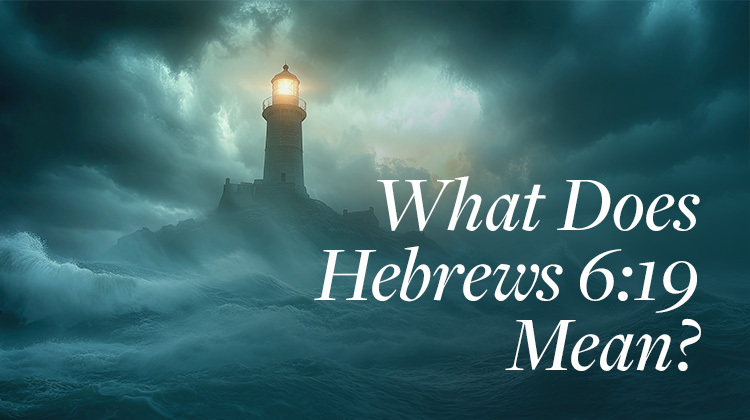We Need Hope When the Seas Are Rough
My favorite passage about hope in the book of Hebrews is in chapter 6, where hope is described as an anchor for the soul. The writer of Hebrews didn’t just give his readers some uplifting quotes or inspirational comments. He pulled them into the heart of the Old Testament and gave them some very serious hours of Bible study. And he told them how our hope is cast upward, behind the veil, where Christ is. Like an anchor, it steadies the soul amid the turbulent storms of life. Read this passage in verse 13 and 17-19 for yourself:
For when God made a promise to Abraham, because He could swear by no one greater, He swore by Himself ….
Thus God, determining to show more abundantly to the heirs of promise the immutability of His counsel, confirmed it by an oath, that by two immutable things, in which it is impossible for God to lie, we might have strong consolation, who have fled for refuge to lay hold of the hope set before us. This hope we have as an anchor of the soul, both sure and steadfast, and which enters the Presence behind the veil ….
Claim and Realize Our Hope
Hebrews 6 tells us, in effect, “If you’re going to withstand the storms, you have to get into the Bible and study it for all it’s worth.” Hope is a mental attitude. It’s not really an emotion or a matter of our feelings. It’s a mindset, and the writer of Hebrews tells us to be diligent to the very end in claiming and realizing our hope.
In this chapter, Abraham becomes an example of someone who fed his soul with the solid food of God’s promises and cultivated hope within himself. As we know from the book of Genesis, Abraham, too, faced disappointment and discouragement. But, according to Genesis 12 and 15, God gave him two things. In Genesis 12:1-3, God gave Abraham a promise—that he would have a son, that his descendants would become a great nation, and through his seed the entire world would be blessed.
Receive Daily Devotions from David Jeremiah
Sign up to receive email devotions each day!
In Genesis 15:8-21, God confirmed this promise with a sacred oath.
For years, no child was born. No son came along. Abraham and Sarah were barren and aging. From a human perspective, the possibilities of producing children faded into impossibility. Yet Abraham never lost hope, for he had both the promise and the oath of God.
The writer of Hebrews 6 explained, “God did this so that, by two unchangeable things [a promise and an oath] in which it is impossible for God to lie, we who have fled to take hold of the hope set before us may be greatly encouraged” (Hebrews 6:18, NIV).
Claim God's Promises
God has given us His promises. He has confirmed them by the death and resurrection of Jesus Christ. And we who have fled from sin and despair must take hold of the hope set before us. We must claim His promises. We must believe He’s working all out for our good. We must envision the eternal life He has prepared for us. We must set our minds on things above. If we do, we’ll live a life that’s greatly encouraged.
But there’s even more in Hebrews 6. In one of the most striking analogies in the Bible, the writer goes on to describe this hope as an anchor for the soul. Hebrews 6:19- 20 says, “We have this hope as an anchor for the soul, firm and secure. It enters the inner sanctuary behind the curtain, where our forerunner, Jesus, has entered on our behalf. He has become a high priest forever …” (NIV).
Any sailor will tell you that you can’t just lower the anchor and let the weight of the anchor steady the boat and keep it from drifting. It can’t just dangle in the water. The anchor has to snag something. It has to grip something on the ocean floor or the ship will be at risk.
As Christians, we don’t drop our anchor downward into the storms of life. We toss it upward, behind the veil, into the very presence of the God of heaven, and it snags on the throne of God. When I was growing up, we had a lot of hymns about this; and even as I’m writing now, the words are replaying in my mind:
Will your anchor hold in the storms of life,
When the clouds unfold their wings of strife?
When the strong tides lift and the cables strain,
Will your anchor drift, or firm remain?
We have an anchor that keeps the soul
Steadfast and sure while the billows roll.
Fastened to the Rock which cannot move,
Grounded firm and deep in the Savior’s love.1
And …
Though the angry surges roll
On my tempest driven soul,
I am peaceful, for I know,
Wildly though the winds may blow,
I’ve an anchor safe and sure,
That can evermore endure.2
And another hymn that’s made something of a comeback recently is “My Hope Is Built on Nothing Less,” and one stanza says:
When darkness veils His lovely face, I rest on His unchanging grace; In every high and stormy gale, My anchor holds within the veil.3
We need hope when the times grow difficult and when the seas grow rough.
Citations:
1Priscilla J. Owens, in the hymn, “We Have an Anchor,” published in 1882.
2William C. Martin, in the hymn, “My Anchor Holds,” published in 1902.
3Edward Mote, in the hymn, “My Hope Is Built on Nothing Less,” published in 1836.
